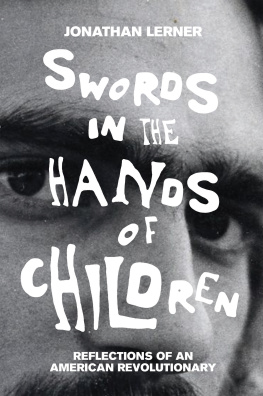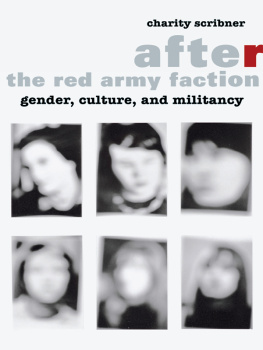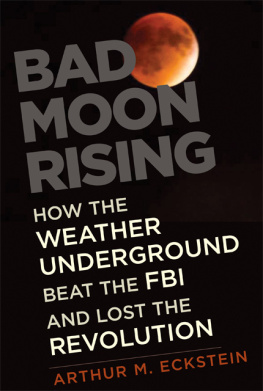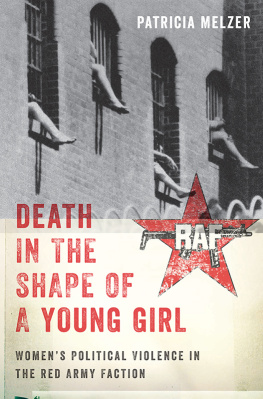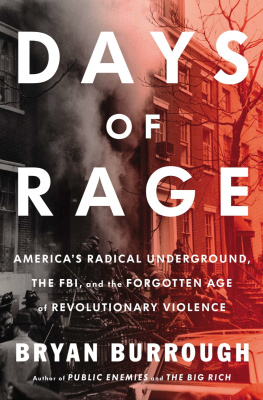Bringing the War Home
The publisher gratefully acknowledges the generous contribution to this book provided by the General Endowment Fund of the University of California Press Associates.
Bringing the War Home
The Weather Underground,
the Red Army Faction,
and Revolutionary Violence
in the Sixties and Seventies
Jeremy Varon

Lyrics to Bob Dylan songs: Ballad of a Thin Man; copyright 1965 by Warner Bros. Inc.; copyright renewed 1993 by Special Rider Music. The Lonesome Death of Hattie Caroll; copyright 1964, 1966 by Warner Bros. Inc.; copyright renewed 1992 by Special Rider Music. My Back Pages; copyright 1964 by Warner Bros. Inc.; copyright renewed 1992 by Special Rider Music. No Time to Think; copyright 1978 by Special Rider Music. Paths of Victory; copyright 1964 by Warner Bros. Inc.; copyright renewed 1992 by Special Rider Music. This Wheels on Fire; copyright 1967, 1970 by Dwarf Music. The Times They Are A-Changin ; copyright 1963, 1964 by Warner Bros. Inc.; copyright renewed 1991 by Special Rider Music. When the Ship Comes In; copyright 1963, 1964 by Warner Bros. Inc.; copyright renewed 1991 by Special Rider Music. Where Are You Tonight? (Journey Through the Dark Heat); copyright 1978 by Special Rider Music. All rights reserved. International copyright secured. Reprinted by permission.
Lyrics to John Fogerty songs copyright Jondra Music. Used by permission.
Lyrics to Grateful Dead songs copyright Ice Nine Publishing Company.
Used by permission.
Lyrics to Phil Ochs songs used by permission of Meegan Lee Ochs.
University of California Press
Berkeley and Los Angeles, California
University of California Press, Ltd.
London, England
2004 by
The Regents of the University of California
Library of Congress Cataloging-in-Publication Data
Varon, Jeremy, 1969.
Bringing the war home : the Weather Underground, the Red Army Faction, and the revolutionary violence of the sixties and seventies / Jeremy Varon.
p. cm.
Includes bibliographical references and index.
ISBN 0520230329 (cloth : alk. paper).ISBN 0520241193 (pbk. : alk. paper)
1. Weather Underground Organization. 2. Weatherman (Organization). 3. Baader-Meinhof gang. 4. RadicalismUnited StatesHistory20th century. 5. RadicalismGermany (West)History20th century. 6. New LeftUnited StatesHistory20th century. 7. New LeftGermany (West)History20th century. 8. Political violenceUnited StatesHistory20th century. 9. Political violenceGermany (West)History20th century. I. Title.
HN90.R3 V37 2004 |
322.4'2'0943dc22 | 2003019002 |
Manufactured in the United States of America
13 12 11 10 09 08 07 06 05 04
11 10 9 8 7 6 5 4 3 2 1
The paper used in this publication meets the minimum requirements of ANSI/NISO Z39.481992 (R 1997) (Permanence of Paper). 
To the loving memory of my mother,
Barbara Frass Varon
In Hell they say Heaven is a great lie.
Daniel Berrigan
Contents
Acknowledgments
The spirit of the sixties has always seemed to me to involve at its core individuals with shared passions working together in pursuit of common goals. Scholarly work, while not entailing quite that kind of cooperation, is far from an isolating endeavor. Indeed, my project has been shaped by many scholars, friends, and others, through whom the rewards of cooperation and something of the spirit of the era I have tried so hard to understand has brightly shone.
Professor Dominick LaCapra of Cornell University played the central role in the conception and execution of this book. He has set a standard for intellectual intensity and professionalism I shall always take as my guide. At Cornell, he headed a team of professors who coached and challenged me: David Bathrick, Laurence Moore, and Michael Steinberg. My friends and colleagues in graduate school are owed equal thanks: Ajay Agrawal, Paul Apostilidas, Michael Doyle, Jeannie Moorefield, Libbie Rifkin, Douglas Usher, and Greg Wawro. Juliet Williamss intellect and character deeply inform all aspects of the project.
Outside of Cornell, numerous scholars have enriched my work: Omer Bartov, Frank Beiss, Bella Brodzki, Michael Burleigh, Belinda Davis, Gary Darden, Ron Grele, Jeffrey Herf, Dagmar Herzog, Matt Matsuda, Elizabeth Pfeiffer, and Michael Schmidtke. Several institutions also provided invaluable support. I am grateful for that offered by the Rutgers Center for Historical Analysis, by the German Historical Institute, and by the staffs at the Columbia Oral History Research Office, the Freie Universitt in Berlin, the Hoover Institution, and the research libraries at Cornell University, Stanford University, and the University of California at Berkeley. My colleagues at Drew University have made the transition into professional life a happy one, while supporting me in completing this project.
Monica McCormick of the University of California Press has been an ideal editor, grasping right away the essence of my project and guiding it to completion with unwavering care. Her staff at the press has been impeccable. Peter Dreyer is owed special thanks for his stellar job in refining the text. Sam Green, a filmmaker working on similar themes, provided assistance and encouragement; it was always a comfort to match impressions and to see our projects as complementing each other. I extend thanks also to Lynne Okin, Alan Trist, and Meegan Lee Ochs for granting me permission to quote the song lyrics of Bob Dylan, the Grateful Dead, and Phil Ochs, respectively. The music of the 1960s was woven into the events of the eraeven when it did not provide direct political and social commentaryand served as a constant companion as I studied, thought, and wrote.
This project, by its nature, has drawn me far beyond academia into the worlds of political activism, both past and present. I am immensely grateful to the women and men formerly of the Weather Underground who spoke to me with great honesty and insight about their experiences. I hope to have honored the trust they placed in me by dealing responsibly and fairly with their histories.
Contemporary activistsBrooke, David, Stuart, Tyler in New York, all those in the Philly house, and my dear friends Jordan Ash and Jonathan Rosenhave reminded me that making history, or simply making a difference, as the sixties generation did, is the far greater challenge than studying the past. Habib Gharib has uniquely embodied for me the ideal of the scholar-activist, demonstrating that good acts start with sound thinking.
I have the privilege of counting as colleagues, friends, companions, and family people of great caring and intellect, who shared generously their ideas, advice, and editorial talents. John McMillian, inspired by the same intellectual callings, has my enduring loyalty and respect. Knowing Anne Kornhauser has been a recent blessing, for the text and in my life. My sister Elizabeth Varon and her husband William Hitchcock, both history professors, blazed the trail I now walk. Barbara and Ben Varon, my parents, provided more than familial love, engaging the substance of the project and the intellectual and political dramas it spawned.
Key Acronyms
APO | Ausserparlamentarische Opposition |
CDU | Christlich Demokratische Union Deutschlands |
DDR | |


